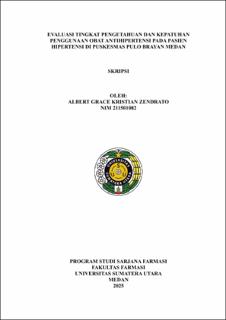Evaluasi Tingkat Pengetahuan dan Kepatuhan Penggunaan Obat Antihipertensi pada Pasien Hipertensi di Puskesmas Pulo Brayan Medan
Evaluation of the Level of Knowledge and Compliance in the Use of Antihypertension Drugs in Hypertension Patients at Pulo Brayan Public Health Center, Medan

Date
2025Author
Zendrato, Albert Grace Kristian
Advisor(s)
Harahap, Urip
Metadata
Show full item recordAbstract
Background: Hypertension is a chronic disease known as the “silent killer” because it is often asymptomatic but at risk of serious complications. Patient non-adherence in taking antihypertensive drugs is one of the main obstacles in the management of
hypertension. Patient knowledge plays an important role in improving adherence to therapy.
Objective: This study aims to evaluate the characteristics of outpatient hypertension patients on the level of knowledge and compliance with the use of antihypertensive
drugs and determine whether the level of knowledge affects patient compliance in undergoing therapy at Puskesmas Pulo Brayan, Medan.
Methods: Descriptive cross-sectional study using Modified HKLS questionnaire to assess knowledge about hypertension and MARS-5 to assess compliance of
hypertension patients. This research was conducted in February-March 2025 at Puskesmas Pulo Brayan Medan. The analysis test used was univariate and bivariate
analysis with the SPSS version 22 program.
Results: From the results of the study, 118 respondents were mostly aged 45-60 years 62 respondents (52.5%); female 69 respondents (58.5%); Senior High School (SLTA) 61 respondents (51.7%); retired / not working 74 respondents (62.7%); ≤5 years 74 respondents (62.7%); and without comorbidities 84 respondents (71.2%). Based on the Kruskal Wallis Test, there was a significant difference between the characteristics of age, latest education, and occupation on the level of knowledge. Meanwhile, the characteristics of comorbidities showed a significant difference in the level of compliance. Based on Spearman's rho test, there is a relationship between knowledge and medication compliance with a low correlation (r = 0.237).
Conclusion: The analysis shows that there is a significant difference between patient characteristics (age, education, occupation) and the level of knowledge, as well as comorbidities and the level of compliance. There is also a significant relationship between knowledge and adherence tos the use of antihypertensive drugs, although with a very weak relationship strength.
Collections
- Undergraduate Theses [1833]
